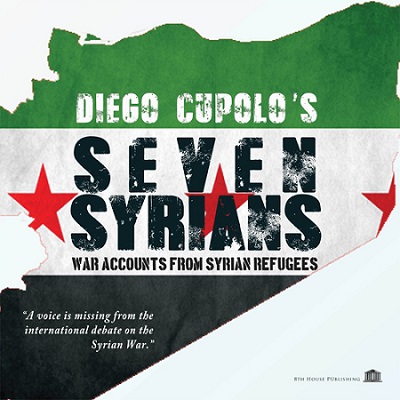 Reviewed: Seven Syrians: War Accounts From Syrian Refugees by Diego Cupolo, (8th House Publishing. December, 2013).
Reviewed: Seven Syrians: War Accounts From Syrian Refugees by Diego Cupolo, (8th House Publishing. December, 2013).
Diego Cupolo’s short collection Seven Syrians: War Accounts from Syrian Refugees is a testimony to the innumerable voices often excluded from conventional coverage of war and conflict. Faces of presidents, generals, and world leaders flash across television screens as Cupolo quietly assembles a collection of flowing narratives of just seven of the estimated 2 million people that have fled the Syrian civil war. In these pages, the brutality and alienation of war are laid bare by the voices of people we might meet in our daily walk through a college town: a barber, a few students, a primary school teacher, a math professor, an English teacher. But here their stories are of survival, hiding, migration, the longing for a normal life, and (above all) a deep desire to return home.
In sharp contrast to traditional journalism, Cupolo’s work abandons what might be called “spreadsheet” journalism – the dry and disconnected recitation of facts, figures, and statistics. Here, we are informed of the war by those living and struggling in the Turkish border town of Reyhanli, a small farming community turned refugee camp where many have fled in the largest refugee crisis since the Rwandan Genocide of 1995. Among the first of the narratives is that of a 34 year old named Ahmed Abdullah who told of the deep veins of racism and discrimination against Sunni muslims in Alawite controlled Syria. As protests mounted against the regime Abdullah watched from a hiding place as his neighborhood was burned to the ground, only to hear a military commander say, “I didn’t come here to burn houses. I need people. Bring me people to kill.”
Throughout Cupolo’s collection of narratives, the reader is struck by the extraordinary circumstances that ordinary people find themselves in. Individual sentences stop the reader cold: “I was studying to become a teacher. Then, the Army started shooting people,” says Aala Shaban, a 23 year old teaching student volunteering at the Al Salam School. Despite this, she hopes to return to Syria and open a similar school for children affected by the war. In the plain and unflinching language of civilians struggling to survive, these seven accounts are profoundly jarring… as they should be. The reader is reminded of Art Spiegelman’s Maus when a character is asked about his experience of the Holocaust he responds, “It was like BOO! Only all of the time.”
Most of the accounts possess a determined but uncertain optimism, the optimism that perhaps only survivors can genuinely articulate. A 36 year old primary school teacher named Abir Hashem recounts her growing support and participation in the protests against the Bashar regime, only to narrowly escape capture and flee with her family to neighboring Turkey. There, she began gathering refugee children together for informal classes in her backyard before working full-time as a teacher once again.
Another teacher, Abdulghaffar Abdulla Othman was once a military accountant in Damascus. After deserting the military and making a month-long trek over the mountains to Reyhanli the trained mathematics professor worked 14 hour shifts in a restaurant before returning to teaching children in nearby schools, this time focusing on democracy and civic engagement. “I am teaching my students to vote,” he says, “what it means to have elections, what it means to have a choice… We never had this in Syria. We were never taught about democracy in our schools. I just found out my wife is pregnant with our second child. We don’t know what the future holds, but we simply want our children to grow in a better Syria than the one we left. I look forward to returning someday.”
Cupolo’s simple and understated book is a powerful, if not staggering, testament to the overwhelming terror of war; a war serving as the unfortunate and victimized proxy of powerful militaries across the globe, each side shoveling money and weapons in the hopes of grabbing more imperial turf. Through these accounts and photographs Cupolo bluntly poses an open-ended question: as world powers continue to jockey and bicker, where will the Syrian civilian stand when the dust settles?
Author Diego Cupolo will be speaking at the Fletcher Free Library in Burlington, VT on Tuesday April 29th at 6pm for On the Ground in Syria: Discussion on the Roots of the Conflict and the Refugee Crisis.
